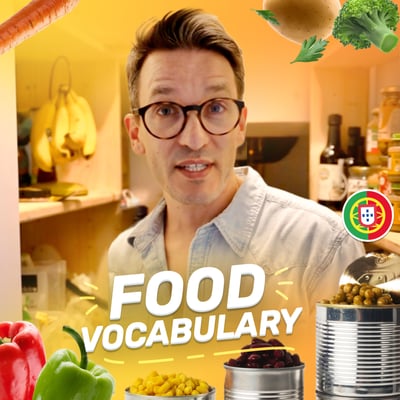Ordering Coffee in Portugal | European Portuguese Listening Practice
Ordering a Coffee in Portugal
In this video, you’ll learn how to order a coffee in Portugal, a task more complex than it seems! There...
Please request our permission before redistributing these files.
Premium Feature: Transcript Downloads
With a Premium Subscription, you can also download PDF transcriptions, with or without English translations for printing or offline use.
- Café é sempre uma boa ideia. Coffee is always a good idea.
- Está claro que em Portugal beber a famosa “bica", o café espresso, It is clear that in Portugal, drinking the famous "bica" (espresso),
- várias vezes ao dia é mais do que uma tradição, é quase uma obrigação. several times a day is more than a tradition, it is almost a must.
- É parte da nossa cultura ir ao café, seja para fazer uma pausa diária e recarregar as energias, It is part of our culture to go to the café, whether to take a daily break and recharge,
- seja para socializar com os colegas e amigos, ou até por a conversa em dia no “café do costume”. or to socialize with colleagues and friends, or even to catch up in "the usual café".
- Ir ao café do bairro onde se mora ou se trabalha, é um hábito nosso, Going to the neighbourhood café where you live or work is a habit of ours,
- e o português vive de tradições como esta. and the Portuguese live on traditions like this.
Premium Feature: Episode Quizzes
With a Premium Subscription, you can take episode quizzes to challenge your comprehension skills and track your progress!
Vocabulary
a aguardentespirit, brandy AltoTall os amigosfriends apenasjust, only AtençãoAttention o bairroneighbourhood, district boagood fem cafécoffee, coffee shop chávenateacup, mug a cidadecity colegascolleagues, peers Com certezaCertainly, Of course, Absolutely, Sure ContrárioUnlike, contrary, opposite conversaconversation Copo de vidroglass costumehabit, custom a culturaculture, cultivation DependendoDepending diáriadaily sing.,fem. EnergiasEnergies EscaldadaScalded a esquinacorner estaThis sing.,fem.,near speaker ExistemThere are famosafamous (fem.) FracoWeak fácileasy grandelarge GuiaGuide GéneroKind, type, genre o hábitohabit, custom a ideiaidea o leitemilk masbut metadehalf ModaFashion muitosmany, a lot of masc. máquinamachine NormalmenteUsually, normally ObrigaçãoObligation outroother, another (masc.) partepart a pausabreak, pause PingaDrop PoucoLittle, few, bit primeirasfirst ProvavelmenteProbably o pódust, powder a quantidadequantity quasealmost, about to recarregarto recharge a regiãoregion SejaBe it, Whether semprealways SimplesSimple TendênciasTrends TiposTypes TradicionalTraditional a tradiçãotradition UsadoUsed VariedadesVarieties vezestimes a vontadethe will, desire váriasseveral, many fem. águawater Expressions
O abatanadoThe americano (espresso with more water) a bicathe espresso regional term, spout O galãoEspresso with sugar and lots of milk A meia de leitePortuguese beverage that is about half espresso and half steamed milk Até à próxima!Until next time!, See you next time! Café curtoEspresso with little coffee Café com cheirinhoEspresso with aguardente, a kind of Portuguese brandy Café pingadoEspresso with just a drop of milk CariocaWeaker coffee, made by passing water through the ground coffee already used to pull another espresso Café sem princípioEspresso made without using the first few drops that leave the machine GarotoA small cup with milk and a tiny amount of espresso Premium Feature: Smart Review
With a Premium Subscription, you can take save these phrases to Smart Review, and use spaced repetition to commit them to long-term memory.
View original post
 Natalia
Natalia











We love the coffee culture here in Portugal and visit a neighborhood cafe almost daily. But I keep ordering cappuccino or espresso and feeling rather foreign doing so…from now on meio de leite and Cafézinho – much better! Thanks for the great videos!
wondering about the expression “fiquei com vontade” ? Could it also be ”
eu estou com vontade?”
Both expressions have the same meaning. However, if you say “Fiquei com vontade” it means that you just got in the mood for or got the will/urge of getting something because of the subject you were just talking about.
If you’re talking about lunch with someone you may either say “Now I got hungry!” or “Now I’m hungry”. So here’s the same: She was talking about coffee, so she got in the mood for coffee. “Estou com vontade” means that you have the will of something regardless the conversation. She could say “Now I’m in the mood for coffee” (“Agora estou com vontade de beber um café”), but “I got in the mood for coffee” (Fiquei com vontade de beber um café) is just a little bit more accurate! Both are correct!
🙂